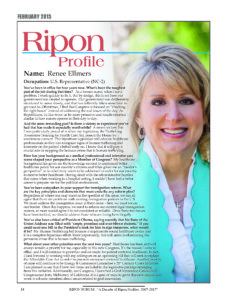…from the February 2015 edition:
Occupation: U.S. Representative (NC-2)
You’ve been in office for four years now. What’s been the toughest part of the job during that time? As a former nurse, when I see a problem, I work quickly to fix it. But by design, this is not how our government was created to operate. Our government was deliberately structured to move slowly, and that has definitely taken some time to get used to. Oftentimes, I find that Congress is focused on “checking the right boxes” instead of addressing the real issues of the day. As Republicans, I’d like to see us be more proactive and results-oriented – similar to how nurses operate in their day-to-day.
And the most rewarding part? Is there a victory or experience you’ve had that has made it especially worthwhile? A recent victory that I was particularly proud of is when my legislation, the Trafficking Awareness Training for Health Care Act, passed the House by unanimous consent. This bipartisan legislation will educate healthcare professionals so they can recognize signs of human trafficking and intercede on the patient’s behalf early on. I know that it will play a crucial role in stopping the heinous crime that is human trafficking.
How has your background as a medical professional and intensive care nurse shaped your perspective as a Member of Congress? My healthcare background has given me the knowledge needed to implement better healthcare policy for our country’s citizens and it has given me an “insider’s perspective” as to what truly needs to be addressed in order for our country to receive better healthcare. Having dealt with the administrative hurdles that come when working in a hospital setting, I couldn’t have had a better career to prepare me for the political environment.
You’ve been outspoken in your support for immigration reform. What are the key principles and elements that must underlie any reform plan? Regardless of where one may stand on the specifics of this issue, we can all agree that there are problems with existing immigration policies in the U.S. We must address the immigration issue in three areas – first, we must secure our border. Once this happens, we need to reform our current legal immigration system, as most would agree it is not consistent or reliable. Once these two issues have been tackled, we should address those who are living here illegally.
You’ve also been critical of President Obama, saying recently that his State of the Union Address was filled with “empty promises and over-blown rhetoric.” If you could send one bill to the President’s desk for him to sign tomorrow, what would it be? My Human Trafficking bill because it implements sound healthcare policy and it is a complete bipartisan effort. More importantly, this will assist in eliminating the pervasive crime that is human trafficking.
What about your other priorities over the next two years? Healthcare has been and will always remain a priority for me, especially in this new Congress. It’s the reason I came to office, and I will continue to prioritize and advocate for patient-centered healthcare. In fact, I look forward to working with my colleagues on an upcoming bill that will seek to replace the Affordable Care Act in order to promote consumer-centered healthcare. Another priority of mine will continue to be Energy & Commerce Committee’s 21st Century Cures Initiative. I am pleased to say that I have two items included in the legislative package emerging from this initiative. Additionally, last Congress, I launched a Grid Innovation Caucus with Congressman Jerry McNerney of California. It is a goal of mine to grow this new caucus and work to educate members about issues related to grid innovation.





